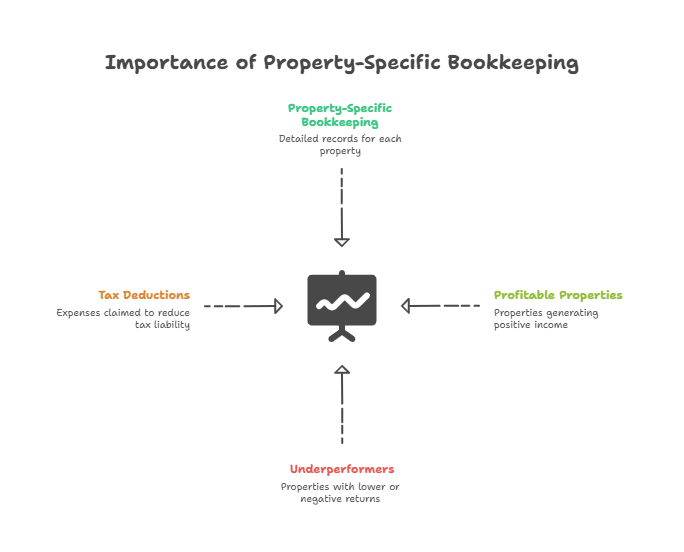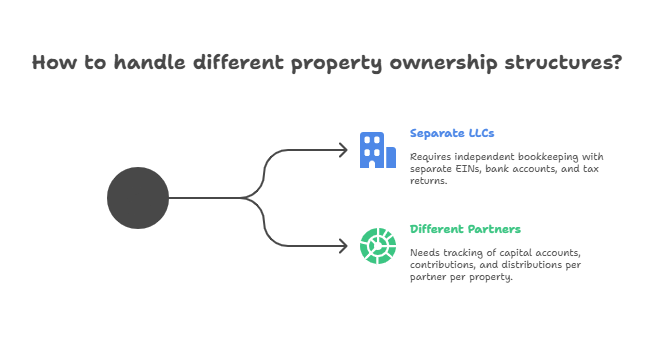Multi-property bookkeeping tracks income and expenses separately for each rental property while consolidating portfolio financial performance. It uses accounting software with project tracking to categorize every transaction by property address. This matters because accurate property-level records prevent missed deductions, simplify Schedule E preparation, and reveal which properties generate positive cash flow.

Property-specific bookkeeping reveals true financial performance. Without it, profitable properties mask underperformers and tax deductions disappear because you can't prove which expenses belong to which property.
The IRS requires separate reporting for each rental on Schedule E (Form 1040). Commingled records mean hours reconstructing transactions, often missing deductions worth thousands. Property-level tracking informs pricing decisions, if Property A generates 12% returns while Property B sits at 4%, you know which needs adjustments.
Key benefits: faster monthly closes, immediate vacancy visibility, simplified loan applications, and audit-ready documentation. Banks want property-level debt coverage ratios before refinancing. Clean books make this a 10-minute report.
Yes, separate bank accounts for each property simplify bookkeeping and protect personal assets. While accounting software can track multiple properties within one account using class features, separate accounts provide cleaner audit trails and eliminate reconciliation headaches.
Most investors open individual business accounts once they exceed 2-3 rentals. The marginal cost runs $10-15 monthly per account, but you save 5-10 hours per property during tax season. Separate accounts work especially well when properties have different ownership structures, Property A personally owned, Property B in an LLC requires distinct accounts anyway.
The one-account approach works for portfolios under 5 properties with identical ownership. Use software with strong class tracking, but expect more manual reconciliation work. For property managers handling client portfolios, separate accounts aren't optional, they're fiduciary requirements. Avoiding common accounting mistakes starts with proper account structure from day one.
QuickBooks Plus ($70/month) and Xero Established ($60/month) offer project tracking that treats each property as a separate profit center. These platforms automatically categorize transactions and generate property-level financial reports.
Property-specific solutions like Stessa, REI Hub, and Buildium integrate accounting with property management. They automatically categorize rental income versus deposits and generate Schedule E reports with one click. Pricing runs $50-100 annually per property for basic plans.
The right choice depends on portfolio complexity. Under 5 properties? QuickBooks Plus handles everything. Managing 10+ properties with different LLCs or short-term rentals? Property management software saves hours monthly. Investors past 20 properties often need outsourced bookkeeping services to maintain accuracy.
Key features to prioritize: bank feed automation, class or project tracking, customizable chart of accounts, Schedule E generation, and mobile receipt capture. Your software should connect bank accounts, credit cards, and property platforms to minimize manual data entry.
Start by creating a standardized chart of accounts applicable to all properties, rental income, mortgage interest, property taxes, insurance, repairs, utilities, management fees, and HOA dues. Consistent categorization makes portfolio comparisons possible.
Enable class tracking (QuickBooks) or project tracking (Xero) and create a class for each property using addresses. Tag every transaction with the corresponding property class. Your software then generates separate profit and loss statements per property.
Link each property's bank account for automatic transaction imports. Review and categorize weekly rather than monthly, fresh memories make categorization faster. Use mobile apps to photograph receipts immediately. Set up vendor accounts with property associations built-in, tagging each invoice with the correct property.
Critical setup steps: separate tenant accounts receivable by property, individual security deposit liability accounts, property-specific loan tracking, and dedicated depreciation schedules. When structuring complex portfolios, choosing between cash and accrual accounting methods impacts both bookkeeping complexity and tax timing.
Mixing personal and business transactions ranks as the top error. Using personal accounts for rental expenses creates tax nightmares. Open dedicated business accounts for every rental, banks offer free business checking with minimum balances.
Failing to track security deposits correctly causes problems. Deposits aren't income, they're liabilities in separate accounts. When deducting for damages, transfer amounts from liability to income and record repair expenses. Many states require dedicated trust accounts for deposits.
Poor receipt documentation costs thousands in lost deductions. Photograph receipts immediately using your software's mobile app. Inconsistent categorization across properties makes analysis impossible. Standardize your chart of accounts across all properties.
Neglecting monthly reconciliation lets errors compound. Reconcile every bank account monthly. This catches duplicate entries and missing transactions before they cascade. Most investors spend 30 minutes per property monthly, time that saves hours during tax season.

Properties in separate LLCs require completely independent bookkeeping. Each LLC needs its own EIN, bank accounts, and tax returns. Your accounting software needs separate company files or multi-entity capabilities.
For properties with different partners, track capital accounts separately. Partner A owns 60% of Property 1 but 40% of Property 2, your books must track each partner's contributions, distributions, and capital balances per property.
Short-term rentals need additional tracking beyond traditional rentals. Record cleaning fees separately from rent, track guest services, monitor occupancy rates, and categorize platform fees. Commercial properties require more detail, track common area maintenance separately and calculate tenant expense recoveries.
When portfolio complexity exceeds your capacity, consider co-sourcing finance functions to blend in-house oversight with specialized offshore bookkeeping for multi-entity portfolios.
Monthly property-level profit and loss statements show income, expenses, and net operating income for each rental. Compare actual results against budgets to spot maintenance overruns or vacancy issues. Most investors review these within 10 days of month-end.
Consolidated portfolio summaries aggregate all properties into one view showing total rental income, portfolio-wide vacancy rates, and aggregate cash flow. Cash flow statements track money movement separately from accrual profits, a property shows $2,000 monthly profit but you're writing $2,500 mortgage checks.
Annual depreciation schedules track basis adjustments, improvements capitalized versus expensed, and accumulated depreciation. Your CPA needs this for Schedule E preparation and depreciation recapture calculations.
Key performance metrics: cash-on-cash return per property, debt service coverage ratios, expense ratios (expenses as percentage of rental income), average days to re-rent, and maintenance costs per unit. Track these quarterly to reveal portfolio strengths and weaknesses.
Yes, separate bank accounts simplify bookkeeping and protect personal assets. QuickBooks can track multiple properties in one account, but separate accounts provide clearer audit trails and easier Schedule E preparation. Most investors open individual business accounts once they exceed 2-3 properties.
QuickBooks Plus and Xero offer project tracking essential for portfolios. Property-specific solutions like Stessa and REI Hub automatically categorize rental transactions and generate Schedule E reports. QuickBooks Plus costs $70 monthly while property software starts at $50-100 per property annually.
Use class tracking or project features to tag every transaction with property address. Create consistent categories across properties, mortgage, insurance, repairs, utilities. Review monthly profit and loss statements to spot issues before they impact cash flow.
Separate LLCs provide liability protection but increase bookkeeping complexity and costs. Many investors hold 2-5 properties per LLC based on equity value. Consult your attorney and CPA before structuring, bookkeeping requirements differ significantly from sole proprietorship.
Security deposits aren't income when received. Record them as liabilities, preferably in dedicated trust accounts as many states require. When deducting for damages, transfer amounts from liability to income and record repair expenses. Return balances within legal timeframes.
You can use one business account with software tracking each property as a class or project. This works for portfolios under 5 properties. Beyond that, reconciliation becomes error-prone. Separate accounts cost $10-15 monthly but save hours during tax season.
Generate monthly property-level profit and loss statements, cash flow reports, and quarterly portfolio summaries. Track occupancy rates, rent per unit, and maintenance as percentage of rent. Annual reports need depreciation schedules and capital improvement tracking for taxes.
Yes. Madras Accountancy provides offshore bookkeeping for U.S. property managers and investors. We process multi-property portfolios, categorize transactions, reconcile accounts, and prepare Schedule E documentation. Since 2015, we've helped 200+ clients reduce overhead 40%.
Multi-property bookkeeping transforms from overwhelming to manageable with the right systems. Separate accounts per property, standardized chart of accounts, and weekly transaction review create audit-ready books that reveal true portfolio performance.
Start with clean systems from Property 1. Use accounting software with class tracking, maintain separate bank accounts past 3-4 properties, and reconcile monthly. Madras Accountancy supports U.S. property managers with offshore bookkeeping expertise. Since 2015, we've processed portfolios for 200+ clients, reducing overhead 40%.

A practical comparison of hiring a freelancer vs using a dedicated offshore accounting team, focusing on continuity, quality control, security, and scaling.

How CPA firms outsource payroll and 1099 work to reduce penalties and admin load, with a clean workflow for approvals, filings, and year-end reporting.

Practical do's and don'ts for CPA firms outsourcing accounting work, based on common failure points and what successful rollouts do differently.